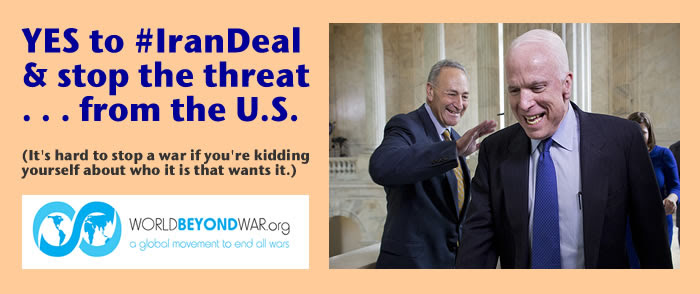I've found there isn't really any way to touch on this topic without misunderstanding, but here's a try. Iran has never had a nuclear weapons program or threatened to launch a war against the U.S. or Israel. Many opponents of the Iran deal in the U.S. Congress and nearly every, if not every single, proponent of the agreement in the U.S. Congress has proposed war as the alternative. Some examples are here. The White House is even telling Congress that the agreement will make a future war easier -- as a selling point in favor of the deal.
Of course, war is NOT the only alternative to the agreement. The threat of war comes from the U.S. An alternative to that would be to simply stop threatening it. No deal is actually needed. The purpose it serves is to slow down a U.S. push for war.
Of course, many ordinary supporters and opponents of the agreement do not want a war. But with Washington offering two courses of action toward Iran: a deal that imposes tougher inspections than anyone else has to deal with, or bombs, one has to choose the inspections.
That is, a moral person does. The "I want a better deal" argument is cynically put forward by people who want no deal at all, even if supported by well-meaning people who have the misfortune to own televisions or read newspapers.
Of course, the Iranian government can be criticized in many areas, none of which are subject to improvement by bombing.
Here are people who have said they oppose the agreement or can't make up their mind about it yet:
Every Republican in the U.S. Senate plus these Democrats (the first two have said No, the rest Undecided):
Menendez (NJ)
Schumer (NY)
Wyden (OR)
Bennet (CO)
Booker (NJ)
Cantwell (WA)
Cardin (MD)
Casey (PA)
Coons (DE)
Heitkamp (ND)
Mikulski (MD)
Murray (WA)
Peters (MI)
Stabenow (MI)
Warner (VA)
This is a much shorter list than what it was when I previously wrote on this topic. In fact, it's at 15, which is almost down to the 13 needed to kill the agreement. Get it down to 12 and the agreement survives. That means two more Democratic senators can come around to the Yes position on the Iran deal and the deal still die. Almost certainly at least those two will. Whether a third does, or more do, is the real question.
When measures voted on are popular with funders but unpopular with the public, they very often pass with no more than exactly the votes needed. Sometimes word leaks out about the deals that have been cut. Senators and House members take their turns giving the unpopular votes demanded by funders and "leadership." The trick here is that the "leadership" is split between Obama's and Biden's YES and (would be Senate leader) Schumer's NO.
The fifteen people named above have had PLENTY of time to conclude that many of their colleagues want to risk a war and to understand that the agreement is preferable to that. It's time for us to let them know we will not stand for them getting this wrong and will never forget it if they do. Here's what I'm asking about my senator, Mark Warner:

Here's what World Beyond War is doing to try to correct the myth that Iran is the origin of the threat of war in this affair:
We must uphold the Iran agreement, but upholding it while pretending that Iran has a nuclear weapons program, or is threatening anyone, will not create a stable and lasting foundation for peace. Upholding an agreement with both proponents and opponents threatening war as an alternative is perilous as well as immoral, illegal, and — given the outcome of similar recent wars based on similar recent propaganda — insane.
You can spread the above message on Facebook here, Twitter here, Instagram here, Tumblr here, and Google+ here.
In the U.S. sign these petitions: one, two, and join these events.
More events all over the world, and tools for creating your own are here.
Outside the U.S., people can contact the nearest U.S. Embassy.

